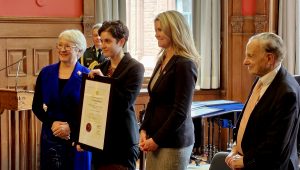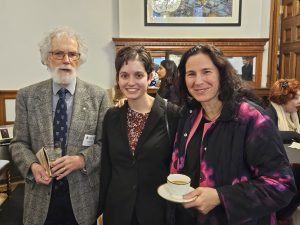CITA faculty Maya Fishbach receives the 2023 John Charles Polanyi Prize in Physics
By: Lyuba Encheva, Canadian Institute for Theoretical Astrophysics

In the picture: Maya Fishbach in the presence of The Honourable Edith Dumont, Lieutenant Governor of Ontario (on the left), The Honourable Jill Dunlop, Minister of Colleges and Universities, and Dr. John Charls Polanyi, winner of the 1986 Nobel Prize in chemistry.
Assistant Professor Maya Fishback, one of the newest additions to the faculty of the Canadian Institute for Theoretical Astrophysics, has been awarded the 2023 John Charles Polanyi Prize for “excellence and potential of research in Physics”. The prestigious honour recognises Fishbach’s pioneering research as foundational to the burgeoning field of gravitational-wave astrophysics and acknowledges its impact both within and outside of the LIGO-Virgo-KAGRA Collaboration.
Fishbach started her PhD the same month that gravitational waves were first detected. Working with a very small data set, she developed methods to analyze the first 11 events known at that time. The tools she developed allowed her to extract the first astrophysical and cosmological lessons from merging black holes and neutron stars, including what black hole masses can tell us about exploding stars, what their spins can tell us about growing black holes from repeated mergers, and what their distances can tell us about the age, size and composition of the Universe.
Maya remembers the excitement of those early days vividly: “When the Advanced Laser Interferometer Gravitational-Wave Observatory (Advanced LIGO) first turned on in 2015, it heard two black holes, each 30 times heavier than the Sun, crashing into each other at roughly half the speed of light. Such collisions, or binary black hole mergers, generate gravitational waves – tiny ripples in spacetime that travel for up to billions of lightyears before arriving at our detectors LIGO, Virgo and KAGRA.”
Black holes are the densest, most extreme objects in our Universe, and the energy bursts released in mergers are “brighter” than all the stars in the Universe combined. However, none of this energy translates in visible light. Only through the remarkably sensitive gravitational-wave detectors that monitor the stretching and squeezing of spacetime, we can finally “observe” these otherwise invisible, cataclysmic mergers.
With data collected from almost 100 events and counting, Fishbach is part of a small but rapidly growing community of gravitational-wave astronomers who are using the LIGO, Virgo and KAGRA detectors to monitor the universe. Through a combination of data analysis and theoretical modeling, Fishbach’s research strives to reconstruct the histories of the most extreme objects in the universe and explain precisely how, where, and when black holes and neutron stars form and merge.

From left to right: Prof. Peter Martin, Associate Director of CITA, Dr. Maya Fishbach, CITA faculty, and Prof. Juna Kollmeier, Director of CITA
“I’m honored to join the inspiring cohort of past Polanyi prize recipients, whom I greatly admire, and for the opportunity to celebrate John Polanyi and his legacy”, says Fishbach in reaction to the news of the award.
Juna Kollmeier, Director of the Canadian Institute of Theoretical Astrophysics, also shares: “I am so excited to see Prof. Fishbach recognized and honored for her important contributions to this most exciting area in astrophysics. A profoundly new era has dawned on humanity, where we can probe the Universe in a fundamentally new way. I brought Maya to the UofT to continue CITA’s work in this critical area, and she carries this torch brightly for the future wherever she goes.”
Prior to joining CITA and the University of Toronto, Maya Fishbach was a NASA Hubble Fellowship Program (NHFP) Einstein Postdoctoral Fellow at Northwestern University (2020-2022), where she collaborated with Prof. Vicky Kalogera’s group. She completed her Ph.D. at the University of Chicago in 2020 under the advisory of Prof. Daniel Holz and her B.S. at Yale University in 2015.
Read more in the Backgrounder, News Release, UofT A&S, UofT Celebrates.